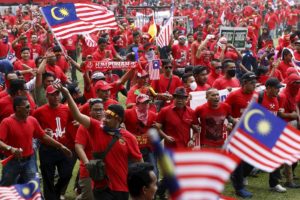Chinese Malaysians seeking asylum as ethnic tensions rise
Increasing numbers of Malaysians are making claims for refugee status in Australia as ethnic and cultural tensions rise against a backdrop of continuing political corruption scandals.
Malaysians – mostly ethnic Chinese – now make up 43 per cent of all claims for asylum in a trend also driven by rising Islamic fundamentalism at home.
Of 4,622 applications for protection visas lodged in 2015-16 with the Migration Review Tribunal (MRT), almost half – 2,006 – were from Malaysian nationals.
 This was more than double the number of applications from Malaysians in 2014-15, according to the tribunal’s 2015-2016 annual report.
This was more than double the number of applications from Malaysians in 2014-15, according to the tribunal’s 2015-2016 annual report.
Chinese Malaysians seeking refugee protection have told the MRT that ethnic Chinese Malaysians who dominate the country’s commercial sector are facing increased restrictions and more persecution by the ethnic Malay-dominated government.
MRT transcripts show one woman told the tribunal: “Our family business was always disturbed by local government, our shop was searched and questioned all the time, we could not be convinced, we did not pay of the so called ‘fines’, but at the end, our family was threatened, blackmailed, we had to close our business, it was our family business, we are living on it, we could not survive without it.”
Another told the MRT: “We are living like a dog, in the past, the Malaysian government kept watch on all the Chinese, if the Chinese children want to enter public school, it would be a very difficult thing – almost impossible.
“The welfare for Malayan is out of reach for the Chinese, the Malaysian political field only trusts Malayan, (they do) not completely trust Chinese, the government does not care about us.”
Malaysia is comprised of several different racial groups with Malays making up almost 70 per cent of the population and the Chinese 25 per cent.
Ethnic minorities have less rights than ethnic Malays under the country’s constitution and has created tension over the years since independence.
In 2015 a riot began after rumours circulated among Muslim Malay youths that a Chinese trader had defrauded a Malayan over a mobile phone.
In September last year, thousands of protesters marched through Malaysia’s capital to declare support for the government and to assert the political dominance of the Malay majority.
The marchers broke down barricades at Kuala Lumpur’s Chinatown neighbourhood, shouting slogans denouncing ethnic Chinese community and opposition party leaders.
The demonstration was organised by figures in the ruling United Malays National Organisation (UMNO) in response to earlier rallies that called for Prime Minister Najib Razak to resign over a financial corruption scandal.
UMNO has controlled Malaysia for 58 years, reserving economic and other advantages for Muslim Malays, saying they were needed to prevent their dominance by the sizeable ethnic Chinese and Indian minorities.
But disgust over alleged UMNO repression and electoral manipulations, as well as frequent corruption scandals, have contributed to a string of election setbacks.
In response, party hardliners have increasingly resorted to racial rhetoric portraying the commercially dominant Chinese as a threat to Malay privilege.
Laurie Nowell
AMES Australia Senior Journalist












